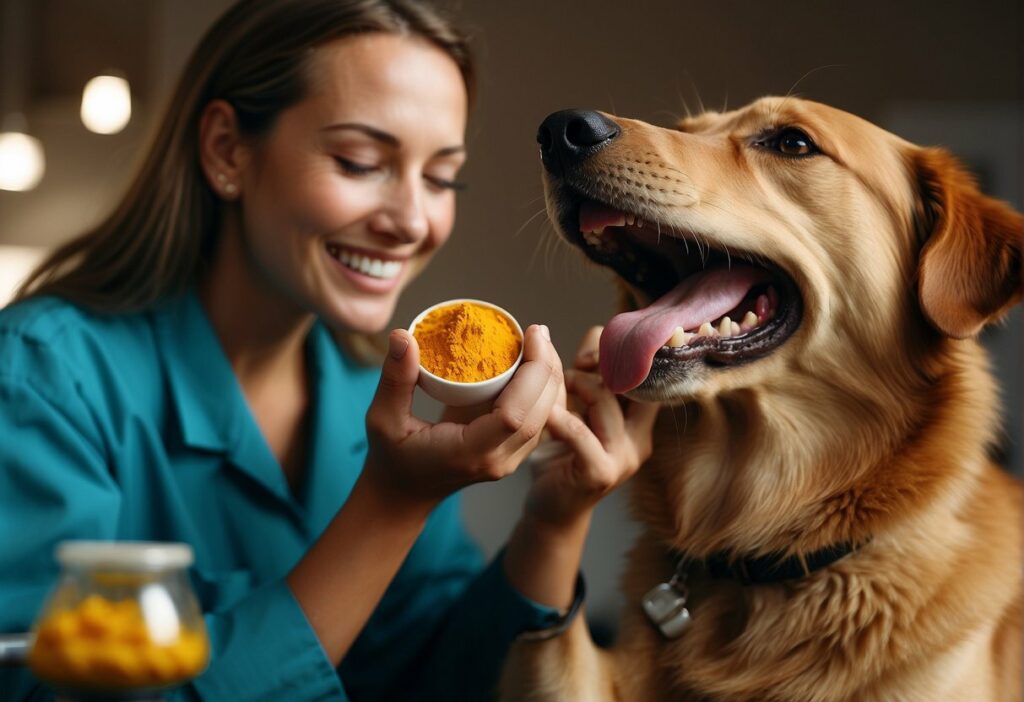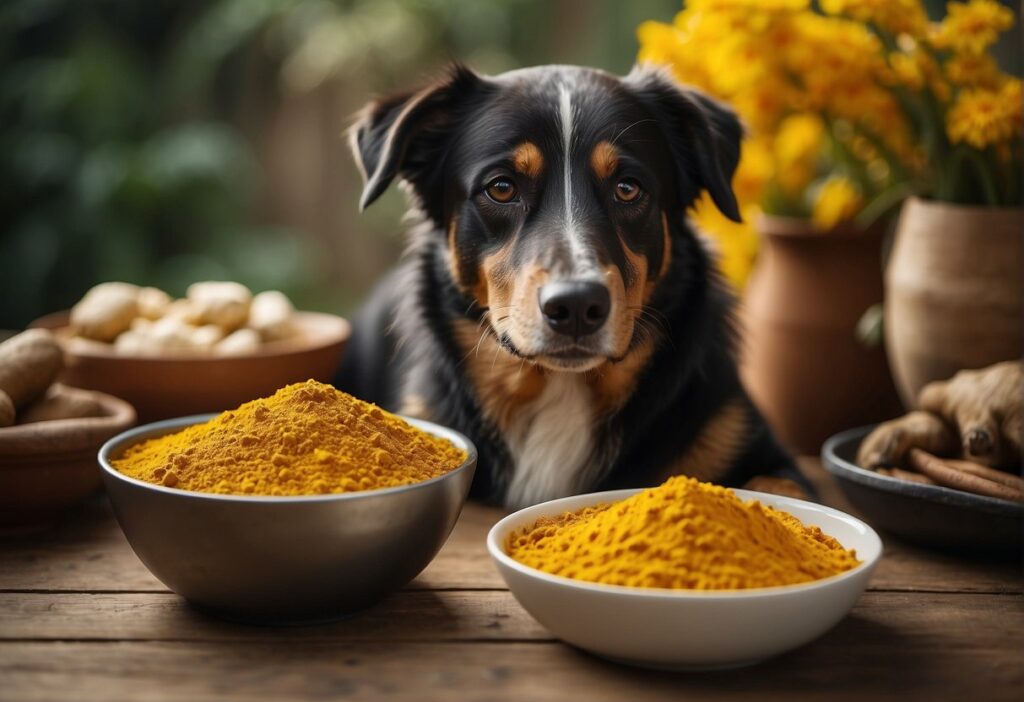As a loving pet owner always on the lookout for natural ways to enhance my dog’s well-being, I’ve discovered that turmeric—a spice renowned for its vibrant color and flavor in human cuisine—also offers a treasure trove of health benefits for canines.
Turmeric’s primary compound, curcumin, has been recognized for its anti-inflammatory properties, which can be particularly beneficial for dogs suffering from joint pain or arthritis.

Incorporating turmeric into my dog’s diet seemed like a promising venture, especially after learning about its potential to support the immune system and play a role in cancer prevention.
Not only does this powerful spice provide anti-inflammatory support, but it also acts as an antioxidant, helping to protect my furry friend’s body from free radicals and potentially reduce the risk of chronic diseases.
Understanding the optimal ways to use turmeric can make all the difference in ensuring my dog reaps all the possible health advantages this golden spice has to offer.
Understanding Turmeric and Its Active Ingredients

Turmeric is a spice that I’ve found fascinating not only for its use in cooking but also for its potential health benefits for dogs.
The golden-yellow powder, commonly used in Indian cuisine, harbors compounds that could be beneficial for improving canine health.
Curcumin’s Role in Turmeric
The primary active ingredient in turmeric is curcumin, a type of curcuminoid renowned for its anti-inflammatory properties.
In my research, I’ve learned that curcumin accounts for only about 2-6% of turmeric but is critical in offering the therapeutic effects often attributed to this spice.
For dogs, curcumin can help to manage inflammation, which is especially beneficial for conditions such as arthritis.
Comparison to Ginger Family and Curcuminoids
Turmeric belongs to the Zingiberaceae or the ginger family, which includes other well-known herbs like cardamom and ginger itself.
What distinguishes turmeric from its relatives are the curcuminoids.
Curcuminoids are bioactive compounds, and apart from curcumin, two other minor curcuminoids in turmeric are demethoxycurcumin and bisdemethoxycurcumin.
These compounds together support turmeric’s health benefits, but they are different in structure and function from the compounds found in other ginger family members.
Potential Health Benefits for Dogs

When I consider natural supplements for my dog, I often think about turmeric.
Known for its vibrant yellow color and health benefits for humans, I’ve found that turmeric can be just as beneficial for dogs, particularly when it comes to reducing inflammation and supporting joint health.
Joint Health and Arthritis
I’ve noticed that as dogs age, they might develop joint pain or arthritis, similar to humans.
The anti-inflammatory properties of turmeric can be a game-changer here.
Curcumin, the active ingredient in turmeric, is widely recognized for its anti-inflammatory effects, which are particularly helpful for dogs suffering from arthritis.
The soothing effect of turmeric can help improve my dog’s mobility and overall joint health.
Cancer Prevention and Treatment
Another promising use of turmeric is its potential role in cancer prevention and treatment.
While I understand that turmeric is not a cure, I’ve read about its effects on inhibiting the spread of cancer cells.
The antioxidant qualities of curcumin can encourage the body’s defense mechanisms and might even help in reducing tumor size.
Reducing Chronic Inflammation and Pain
Chronic inflammation can cause my dog a lot of discomforts, but turmeric could offer some relief.
This super spice has wound healing and anti-inflammatory benefits that may alleviate both long-term inflammation and related pain.
For managing chronic conditions or even recovery post-injury, turmeric’s curcumin could support the healing process by mitigating pain and swelling.
Safe Usage and Dosage

Before incorporating turmeric into my dog’s health regimen, I find it essential to understand the safe usage and proper dosing.
It’s crucial to ensure that I am providing my dog with an effective yet safe amount of turmeric, taking into account its bioavailability and always consulting with a veterinarian for personalized advice.
Determining the Correct Dosage
When it comes to determining the correct dosage of turmeric for my dog, I have learned that it can vary based on my dog’s size, weight, and overall health condition.
A general guideline is to start with a small dose, such as 1/4 teaspoon per day for small dogs and gradually increase to a recommended dose of up to 1 tablespoon per day for larger breeds if there are no signs of digestive issues.
Understanding Bioavailability
Turmeric’s active component, curcumin, has low bioavailability, which means that it’s not easily absorbed by my dog’s body.
To improve this, I can combine turmeric with healthy fats like coconut oil or with black pepper extract known as piperine, which can increase the absorption of curcumin by up to 2000%.
Consulting with a Veterinarian
The importance of consulting with a veterinarian cannot be overstated.
Before I adjust my dog’s diet or add supplements like turmeric, I make sure to get the green light from my vet.
They can provide a safe dosage tailored to my dog’s specific needs and monitor any reactions or interactions with existing medications.
Forms of Turmeric Supplements

When looking to supplement my dog’s diet with turmeric, I find it’s crucial to choose the right form that suits my pet’s preferences and needs.
The supplements come in various forms, and I always make sure they’re made specifically for canine consumption to ensure safety and proper dosage.
Powders, Chews, and Capsules
I love the flexibility that turmeric powders provide.
They’re easy to measure and can be mixed into my dog’s food, making it a convenient option.
Chews are even more straightforward—these are great for dogs who see them as a tasty treat.
And for precision in dosage, turmeric capsules are my go-to; they can be given whole or opened to sprinkle the contents on meals.
Liquid Extracts and Mixes
Alternatively, turmeric liquid extracts are fast-acting since they can be readily absorbed into the body.
I find that they mix well into wet food or can be given directly by dropper.
There are also pre-made turmeric mixes designed for dogs, often including other beneficial ingredients to support health.
Recognizing and Managing Side Effects
In my experience incorporating turmeric into my dog’s diet, it’s important that I pay close attention to how it affects their health.
While turmeric can offer benefits, like any supplement, it may also come with potential side effects.
I’ve learned that it’s essential to know what to watch for and how to respond if my dog doesn’t react well to turmeric.
Common Adverse Reactions
Some dogs, like humans, can experience adverse reactions to turmeric, most notably gastrointestinal issues such as diarrhea or vomiting.
If I notice that my dog exhibits loose stools or an upset stomach after introducing turmeric, it’s a clear sign to reconsider its usage.
A few methods I’ve found to manage minor side effects include:
- Reducing the dose: I start with a smaller amount than recommended and gradually increase it, allowing my dog’s system to adjust.
- Diet alteration: Incorporating turmeric with a meal can sometimes alleviate stomach upset.
- Hydration: Ensuring my dog drinks plenty of water to help flush out their system.
When to Stop and Seek Veterinary Care
In my role as a pet owner, recognizing when side effects are severe enough to require professional intervention is crucial.
If my dog shows signs of allergic reactions, such as hives, swelling, or difficulty breathing, it’s an immediate red flag.
Likewise, consistent episodes of vomiting or diarrhea indicate that turmeric is not agreeing with their system, and I’ll stop administering it.
Here’s what I do if serious side effects occur:
- Discontinue use: I immediately cease giving my dog turmeric if they exhibit any worrying symptoms.
- Keep a symptom log: Noting all the symptoms and their severity helps me to inform the veterinarian accurately.
- Consult the vet: I never hesitate to contact my veterinarian to discuss any concerns and determine the best course of action.
By closely monitoring my dog and adjusting their turmeric intake as necessary, I can enjoy the benefits while minimizing the risks.















